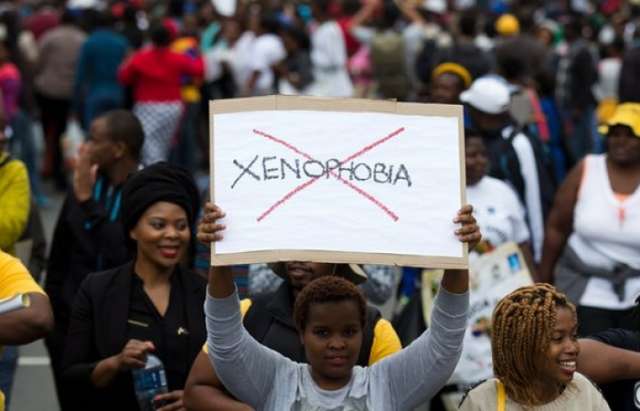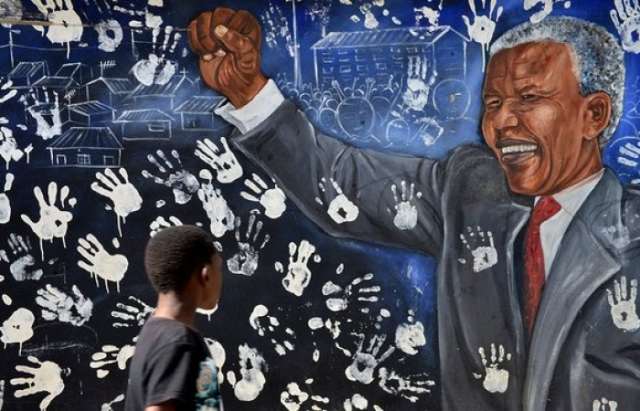In 1994 Shoshozola became the unofficial anthem of South Africa’s “miracle” transition into democracy. Taking its title from the Ndebele word for “going forward”, it was a song expressing the hardship of the lives of migrant labourers from what was then Rhodesia, who travelled on steam trains to work in South Africa’s mines. Today it has a painful irony as migrants find themselves no longer welcome in post-apartheid South Africa.
A recent spate of violent attacks led to an anti-xenophobia protest on 9 March. About 200 locals and foreigners, under the banner of the Coalition of Civics against Xenophobia, took to the streets of Pretoria calling for an end to the violence against foreign-born Africans and South Asians in South Africa’s townships and inner cities.
Today Shoshozola has a painful irony as migrants find themselves no longer welcome in post-apartheid South Africa
Having been born in Zimbabwe and lived in South Africa for as long as it has been a democracy, I was as warmed by the solidarity as I was upset by the violence. I am reassured especially to see reports of the march acknowledge that “issues of unemployment‚ housing and crime are central” to the attacks.
Understanding and acknowledging the root causes of the violence has been largely missing from the public discourse here in South Africa. Too often the attackers have been dismissed as “irrational”, or provoked calls for more “hospitality that defines our democratic order”, in the words of the Nelson Mandela Foundation. Both reactions seem to miss two key facts: South Africa isn’t anti-immigrant, it’s anti-black, and this violence is evidence that the “miracle” has failed the very people it should have uplifted – poor black South Africans.
Explaining why the violence is specifically anti-black or Afrophobic, the University of South Africa professor Rodney Tshaka described xenophobia as the fear of the other, while “Afrophobia is fear of a specific other: the black other from north of the Limpopo river [in other words, from Zimbabwe or Mozambique and beyond them, the rest of Africa]. If foreigners generally were the main target, those who are anti-foreigner would no doubt have sought out all foreigners and made it known that they are not welcome in this country.”
The fact that Africans bear the brunt of the violence isn’t simply about the numbers, though over 75% of international migrants living in South Africa come from the rest of the continent. Foreignness, or the notion of “other”, has a long, anti-black history in South Africa. Until 1994’s elections, black South Africans were not citizens of South Africa, but of “homelands” or “Bantustans”, areas where the black population was resettled under apartheid. The South Africa of postcards was the preserve of the white settler minority, who did not see themselves as part of the African continent.

Dismissing the attacks as “common township thuggery” or having “nothing to do with xenophobia” also ignores the fact that the post-apartheid dispensation has yet to deliver economic justice for black South Africans. A black-led government presides over an economy that is white-dominated, and which frequently ranks among the most unequal in the world. Economic inequality is said to have exploded after the end of apartheid, with the wealth of the top 10% growing by 64% in the first 17 years while the poorest 10% have seen no financial growth at all. It is not insignificant that the recent violence comes at a time when calls for “radical economic transformation”, which specifically includes land redistribution, have grown louder from factions within the ANC and opposition parties such as the Economic Freedom Fighters.
The accusation that (black) foreigners are stealing South African jobs also ignores the long history of regional migrant labour, predominantly from Mozambique and Zimbabwe.
My family became a part of that history when we emigrated from Harare in Zimbabwe to Umlazi, a township outside Durban. My father, like many other doctors from Zimbabwe, was recruited to staff South Africa’s public hospitals under the structural adjustment programmes of the 90s. After the turn of the millennium we moved to Polokwane, 200km from Beitbridge, the busiest border post on the continent. Although my classmates would call me “lekwerekwere” (a pejorative term for black foreigners), I knew even then that we were different from the so-called border jumpers, the thousands of informal, hospitality and agricultural sector workers who fled Zimbabwe’s economic collapse. Though I am often made aware of my foreignness, I – like many other foreign-born nationals with “good papers” – have not experienced the same degree of physical vulnerability as other Africans living in the townships and inner cities because I have been insulated by my class.
South Africa is a hostile place for the poor and working class, but economic migrants will continue to come, attracted by the opportunities made possible by democratic government, good infrastructure and economic stability. Still, without social justice and a radical economic transformation that includes land redistribution, the promise of South Africa’s “miracle” will become increasingly untenable.
Panashe Chigumadzi is an award-winning novelist and essayist.
/The Guardian/
More about: #Africa















-1745485667.jpg&h=190&w=280&zc=1&q=100)
































